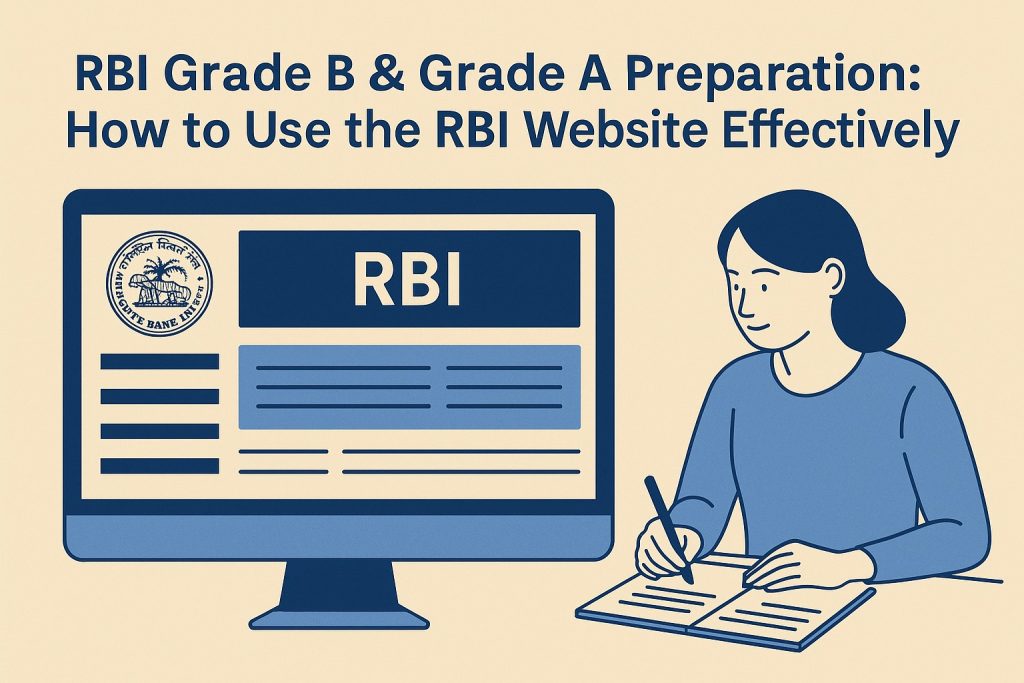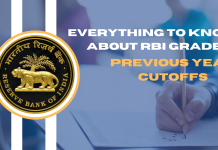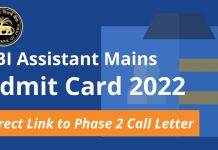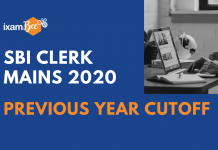Preparing for RBI Grade B and Grade A exams can feel overwhelming due to the extensive syllabus and the limited time available for preparation. Many candidates rely heavily on coaching notes, summaries, and secondary study materials to save time. However, while these resources can provide guidance, they often lack the depth and authenticity required for a strong conceptual understanding.
A more effective approach is to use the official RBI website as the primary source of information. It offers updated and original content directly from the institution, covering crucial topics such as monetary policy, banking regulations, currency management, and financial inclusion. These sections form the foundation of the exam syllabus and help build a clear understanding of the central bank’s role in the economy.
Using the RBI website also ensures that candidates stay aligned with real-time policy changes and accurate data, which are essential for both the objective and descriptive papers. Along with this, focusing on authentic content encourages aspirants to develop a genuine interest in the RBI’s functioning. This deeper engagement not only aids in better retention but also helps build confidence for interviews, making preparation more comprehensive and exam-oriented. Through this blog, we have told you exactly how you can do so.

Why the RBI Website is the Best Resource for RBI Grade B Preparation
The official RBI website contains everything you need to build a strong foundation for the exam. From monetary policies to financial inclusion reports, it offers accurate, updated, and original content. Unlike secondary materials, which can sometimes be outdated or incomplete, the website provides information straight from the source.
According to experts, nearly 50% of the RBI Grade B and Grade A syllabus can be covered directly by using the RBI website. Some important sections to focus on include:
- Monetary Policy – Understand how the RBI controls inflation and ensures economic stability.
- Banking Regulations – Learn about the rules that guide banks and financial institutions.
- Currency Management – Study how currency is issued and controlled in India.
- Financial Inclusion – Explore RBI’s efforts to make banking accessible to all citizens.
- Current Rates and Data – Stay updated on repo rates, reverse repo rates, CRR, and other vital statistics.
By concentrating on these sections, candidates can cover the core topics that frequently appear in exams.
RBI Grade A and Grade B Study Plan: Managing Time Effectively
One of the biggest struggles aspirants face is balancing the vast syllabus with limited time. The RBI website contains thousands of pages, including circulars, reports, and speeches. Reading everything in detail is not practical within a few months of preparation.
Experts suggest creating a strategic study plan. Start by identifying high-weightage topics based on previous years’ papers. Dedicate more time to sections like monetary policy and banking regulations since they form the backbone of the exam.
Time management also involves cutting down on distractions. Social media, TV shows, and unnecessary entertainment can eat up valuable study hours. Experts advise aspirants to temporarily reduce these activities and create a focused routine. Everyone has the same 24 hours, but using them wisely makes all the difference.
Understanding Core RBI Functions for Exam Success
To clear RBI Grade B and Grade A exams, candidates must understand the central bank’s role in the economy. This goes beyond memorizing facts. you need to learn about RBI’s core functions such as:
- Implementing monetary policy
- Issuing currency
- Regulating banks and NBFCs
- Managing foreign exchange and reserves
- Promoting financial inclusion
Knowing these functions helps answer objective questions and strengthens descriptive answers. It also proves useful during interviews, where panelists look for candidates who understand the RBI’s real-world impact.
How RBI Reports and Speeches Can Boost Your Preparation
One of the strongest recommendations is to regularly read RBI reports and speeches. These include:
- Monthly economic bulletins
- Financial stability reports
- Speeches by the RBI Governor and Deputy Governors
These documents provide insights into the current economic scenario and RBI’s policy decisions. They also help candidates connect theoretical knowledge with real-life application. For example, understanding why the RBI changed the repo rate can help you write strong descriptive answers and discuss policies confidently in interviews.
Key Financial Terms Every RBI Aspirant Must Master
Exams often test candidates on terms like repo rate, reverse repo rate, CRR, SLR, and marginal standing facility (MSF). Experts advise aspirants to go beyond memorizing numbers. Focus on understanding what these terms mean, how they work, and their impact on the economy.
For example, knowing the repo rate is not enough. You must understand how a change in the repo rate affects inflation, lending rates, and overall economic growth. This deeper knowledge helps tackle tricky, application-based questions.
Discipline and Passion: The Hidden Ingredients for Success
Experts believe that success in RBI exams depends as much on mindset as on study material. Discipline ensures consistent preparation. Creating a realistic timetable, following it strictly, and avoiding procrastination are key habits of successful candidates.
Equally important is developing a passion for the RBI’s work. When you understand how the RBI’s policies shape the economy, you study with greater interest and motivation. This passion reflects in your answers and interview performance, making you stand out as a genuine candidate.
Coaching and Expert Guidance for RBI Grade B Preparation
While self-study using the RBI website is essential, expert coaching can speed up your preparation. Learning from former RBI officials or experienced faculty provides insights into exam trends and strategies. Experts mention that combining authentic resources with expert guidance creates a balanced approach that saves time and builds confidence.
Putting It All Together: A Smart Approach to RBI Exam Prep
To succeed in RBI Grade B and Grade A exams, aspirants need to combine three elements:
- Authentic Content – Use the RBI website as your primary source.
- Effective Time Management – Prioritize topics and stick to a study plan.
- Mindset – Maintain discipline and passion throughout your preparation.
Focus on core RBI functions, read reports and speeches, and master financial terms to strengthen your knowledge base. Avoid distractions, use your time wisely, and stay consistent. You can check out the video below for understanding this better:
Summing Up
If you are an aspirant, start making the RBI website your go-to resource. Approach it strategically, build a study plan around core topics, and combine self-study with discipline and passion. With the right approach, you can move closer to achieving your dream of becoming an RBI officer.
ixamBee specializes in providing expert guidance and resources for banking exams 2025, ensuring that you are well-prepared for the Upcoming Bank Exams like RBI Grade B, NABARD Grade B, IBPS SO, and more. Our courses align with the bank exam calendar 2024, covering all the essential topics. With a focus on the upcoming bank jobs, our Previous Year Papers, BeePedia, SSC CGL, SSC CHSL, SSC MTS and other Mock Tests are designed to help you excel in upcoming banking exams.
Also Read:
IB ACIO 2025: Important Topics for Current Affairs IB ACIO
IFSCA Grade A Notification Expected Soon: Guaranteed Preparation Tips For Aspirants
RBI Grade B Officer: Background Doesn’t Matter — Your Preparation Does














